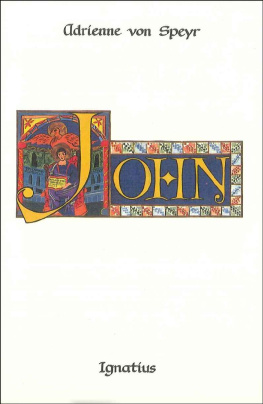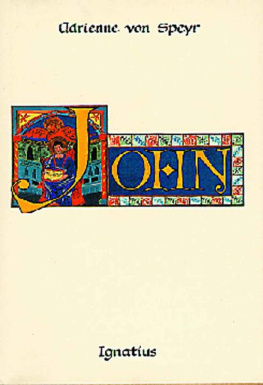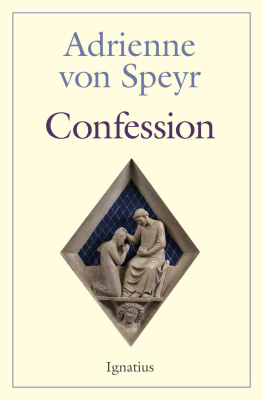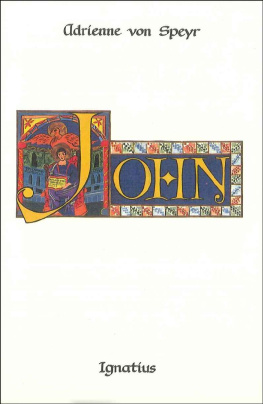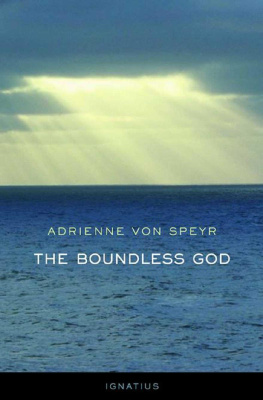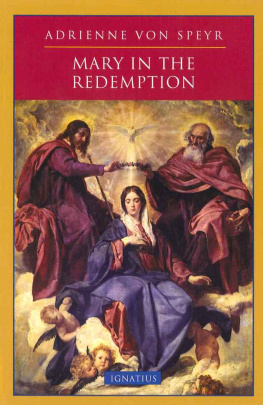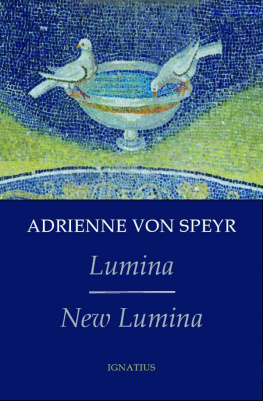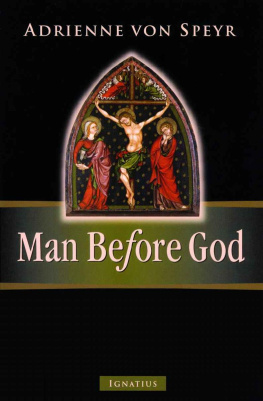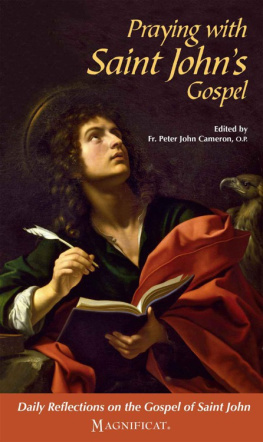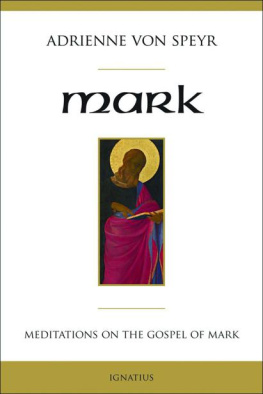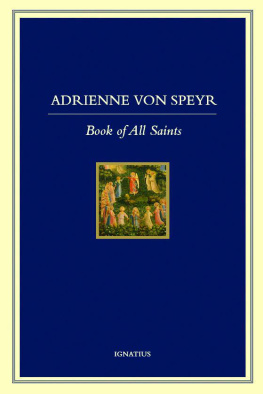THE DISCOURSES OF CONTROVERSY
ADRIENNE VON SPEYR
THE DISCOURSES
OF CONTROVERSY
Meditations on John 6-12
TRANSLATED BY BRIAN MCNEIL, CRV
IGNATIUS PRESS SAN FRANCISCO
Title of the German original:
Die Streitreden
Betrachtungen ber Johannes 6-12
1949 Johannes Verlag, Einsiedeln
Cover by Victoria Hoke Lane
1993 Ignatius Press, San Francisco
All rights reserved
ISBN 978-0-89870-412-9
Library of Congress Catalogue Number 92-71939
Printed in the United States of America
CONTENTS
FOREWORD
Like the volume that has already appeared on the Farewell Discourses , the present volume, too, explicitly calls itself a book of meditation. Thus it is not an exegetical work; one will discover in this book neither philological nor exegetical information, nor any other kind of academic information. It is not even a reading book that one might work through quickly; it would probably look merely colorless and long-winded, disappointing and wearying the reader. Its aim is to be truly a help for meditation.
It always starts from the presupposition that Christian meditation on the divine word must be aware that what lies before it is no finite human word, but the infinite divine word in human garb. The meaning of this word is inexhaustible and utterly profound, andsince it is divineit can ultimately be interpreted only by means of itself. Each divine word, and thus each verse of the Gospel, contains latent within itself the fullness of the eternal life, the mysteries of heaven, the ocean of trinitarian truth and love. Mary, who chose the best part, was able to penetrate, as she heard each word that comes from the mouth of the divine Truth, through to the point where all the individual truths stream together to form the indivisible, absolute, total truth. But each of these words wishes to be taken initially as if it were the only word: with the souls entire gift of itself, a gift made possible by grace, through faith, love and hope. Indeed, the grace that receiveswhich is precisely the life of faith, love and hope in usis of no other substance than the grace that reveals; the faith through which we believe and the faith in which we believe are only two faces of the same divine reality that God has communicated to us. This is why it is continually presupposed in this book that faith, love and hopethese three that remain when all the other gifts shall have passed awayare also best able to disclose to us something of the essence of eternal life, of the inner life of God.
The choice of the title Discourses of Controversy may be less appropriate than the title of the following volume, Farewell Discourses , but it can be justified a parte potiori . Although various other events are included here and there by the Evangelist in these chapters, these too are primarily seen by him as the occasion for new disputes in which the Lord confronts the Jews. In keeping with the intention of the discourses themselves, the primary aim in the meditation on these is to present the moment in which the limited, egocentric standpoint of the Jews, based on reason, must let itself be burst open into the unlimited, loving standpoint of the Lord, based on faith. This one stepthe step from the Old Covenant, which has been given a false human interpretation, over to the Newmust be carried out in ever new variations, in ever new illumination, in grace that takes on ever new forms. Thus, nothing in these discourses of the Lord is historical, belonging only to the past: rather, everything is relevant to our own period, everything is contemporary, Christian life.
Hans Urs von Balthasar
THE MULTIPLICATION OF THE LOAVES
6:1-2. After this, Jesus crossed over to the other shore of the Lake of Galilee, which is also called the Lake of Tiberias. A numerous crowd followed him, because they saw the wonders he performed on those who were sick . The great crowd follows the Lord. They do so, not in faith, not in love, but in curiosity and in the self-seeking expectation of further signs. But the Lord makes a distinction between this kind of curiosity and a mere egotism. He makes use of the weakness of the curiosity in order to form out of it a path that leads to faith. But he never employs the sin of egotism as a preparing of the way for love. The Lord never makes use of our sin in order to redeem us from our sin, for active egotism includes the active turning away from love. But where weakness and paralysis are present, the Lord is able, and desires, to begin something new. It is not the recognition of our sin that leads us to repentance and conversion but the recognition of his love. In order to free us from our state of captivity in sin, his love leads us away from sin; for sin is a sheer hindrance in us, never an occasion of growth. But the Lord can very well make use of a weakness in order to lay down a path that leads from it to a faith that will lead to love only later on.
In its curiosity, the crowd begins to have a faint perception of his grace. It follows him because it has seen the wonders he performed on those who were sick. Thus, the reason is not something that the people themselves have experienced in their own persons: and so they think that they are objective and detached spectators of an event that does not affect and concern them in their own internal lives. And yet, there already lies a touch of selflessness in this. The people in the crowd are no longer totally occupied with themselves and their own need. They have begun to open themselves out to something that is not themselves.
6:3-4. But Jesus went up the mountain and sat down there with his disciples. Passover was near, the feast of the Jews .
The Lord takes up a position vis--vis the crowd when he climbs the mountain and sits down. He shows himself in all his humanity to these human beings: he does not hide the fact that he needs rest. What he does here is in sharp contradistinction to their previous confrontation with his divinity, which had appeared to them in a form too strong and too invulnerable. They had not found any human road of access to it. But now he shows them his humanity, and this seems to them to lack the divine dignity. Previously they had been irritated at finding no sign of weakness in his spirit, now they are irritated because they discover these signs of weakness in his flesh, but without being able to convict him of sin. They recall to themselves the wonders at which they have been present. They have seen the conversion of the Samaritan woman, but they have not found any trace of forbidden fleshly lust in her relationship to the Lord. Likewise, they have seen the lame man and the son of the officer, but they have found no spark of self-satisfaction and arrogance in the word with which the Lord exercises his power. In each miracle, they have been lying in wait for the moment he would be exposed, when the possibility of sin would become visible, so that the marvelous and the good in Jesus would change into their human opposites, and in him, too, that which was light would be balanced by that which was dark. But they have not found anything in his spirit, and the need that is derived from his bodily weakness and tiredness only lets his spiritual inviolability shine forth all the more strongly. The Lord uses human weakness as the point of departure to make love grow in them instead of sin. The people seek in him the same weakness, or at least an initial sign of thisnot in order to bear witness to him of their love, but in order to convict him of sin.
6:5. Now when Jesus raised his eyes and saw that a great crowd was coming to him, he said to Philip: Where are we to buy bread, so that these people may eat ?
The Lord feels the physical need of the people; he shares it himself. On the basis of this solidarity in need, he feels responsible for them, and thus he looks around for bread. But he does not wish to bear any responsibility without giving his disciples a share in it: this is why he asks Philip where they are to get the bread. The disciple is to have his share in what is now going to happen, he is to walk with Jesus from the very beginning along the entire path of the miracle. In this question between himself and the disciple, the Lord creates a common obligation that is so deep that is goes beyond the human standard of measurement and is not at all visible to the others. And when he gives Philip admittance to his mystery and bids him share in carrying its burden, the catholic element is present. This is basically present already, as soon as the Lord appears in the world. In Mary, who conceives the Lord, the entire Church is already prefigured, since Mary is the sinless archetype of every creature who is drawn into the work of the Trinity and initiated into it. Just as at that time God did everything but did not wish to work without the human person, so now, too, the Lord will perform the miracle visibly and in person, yet he will not do it without the disciple. He gives him a share in the responsibility, a share that is invisible and, so to speak, official. Philip perhaps does not perceive at all what is going on or into what he is being drawn. And yet, through the question of the Lord, he is included, made the object of obligation and demand in a supernatural manner. This is one of those acts whereby the Lord recruits someone, permitting one who believes in him to share in his own working so that he may make him in a special measure a witness of what he himself performs. He accepts the human dimension as his framework when he draws men to himself and makes use of them in his work. Through people, he creates points of transition to himself. There are no steps that lead up to his pure divinity. But in his saints (and Philip is their representative here), he constructs a kind of stepladder that leads to himself. His cooperation is so subordinate, indeed, so microscopically small, that it in fact only casts a stronger light on the working of the Lord. But it is precisely in this function that he is needed. When he must appear later on as a witness to this scene, he will be able to describe its human elementthe expectation and the curiosity of the crowd, its hunger, the gestures and words of the Lordin all its humanity, making the miracle more vivid for people than it was for anyone else who was present in the crowd at that time, because he was the one to whom the Lord put his question, he was the one who participated in this action. Even at the moment of the question, he knew already that the Lord had an answer ready, even if he, Philip, did not know it yet; and, through the question, he himself already shared in the answer. He possessed the readiness that must be present in those of whom God makes demands: they do not know for what service they are being engaged, and they must be prepared for anything, but still they know that the Lord already knows everything in advance.
Next page
